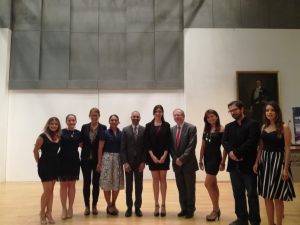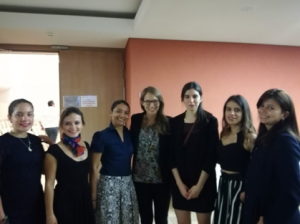Coming back with a suitcase full of ideas!


By Lina P. Chaparro Martínez
Doctoral Student in Political Science
Universidad de los Andes
Dear readers, I am here to tell you about how one of the academic research based initiatives implemented by Instituto CAPAZ supports an understanding of the dynamics of the peace process in Colombia.
Thanks to the scholarship granted by CAPAZ, in summer 2017, six Colombian students (all women and among which, I am happy to say, I was included) had the opportunity to attend the summer school in International and Comparative Law, at Wisconsin and Marquette Universities (United States) and the Justus Liebig University in Giessen (Germany), to take courses in Comparative Constitutional Law and Business Ethics and Human Rights.
One of the reasons for attending an international summer school is the possibility to discover different legal schools and traditions based on the experiences of classmates and professors. The learned perspectives on the political and peace processes, armed conflict, peace building and the implementation and guarantee of human rights all over the world were all very diverse.
The other aspects that make this a pleasant opportunity for all interested parties include, of course, the fact of getting to know Germany and it’s educational system, and I am not only talking only about the majesty of its landscapes, which, flooded with green, explain why recycling is at the centre of Germany’s civic ethics, and all of the permanent, sensible, and respectful legal efforts to promote exercises of the historical memory that speak of its position as a society. I also refer to the diversity and puritanism of German society, which generously receives students from all around the world offering them –as it offered us- an entire portfolio of facilities: a bilingual society, an efficient transport system, low living costs and a broad cultural offer. So student life is cheap and fun, promoting increased intellectual productivity.
I guarantee, dear reader, that in Germany you will find a quality academic system where research and academia occupy a privileged position where reality is understood and in which research agendas permanently facilitate meeting points between different disciplines and approximations of all kinds. In my case, it was exciting to identify an entire horizon of possibilities from which to approach the main question for my doctoral research, related to the factors that affect the design of transitional justice models and the interests of actors that have not been traditionally studied, as is the case with business elites.
The research I am undertaking is fuelled by a summer school like the one in Giessen, which dealt with global problems from an interdisciplinary perspective of the theory of international law analysed aspects such as comparative methodologies and firm obligations to respect Human Rights.
Everything up to this point seems formal, but what I want to say is that this opportunity (undoubtedly possible, because I already had it!) is wonderful, and provides students with the chance to come back with thousands of ideas to contribute to understanding this all-important peace process for Colombia.



